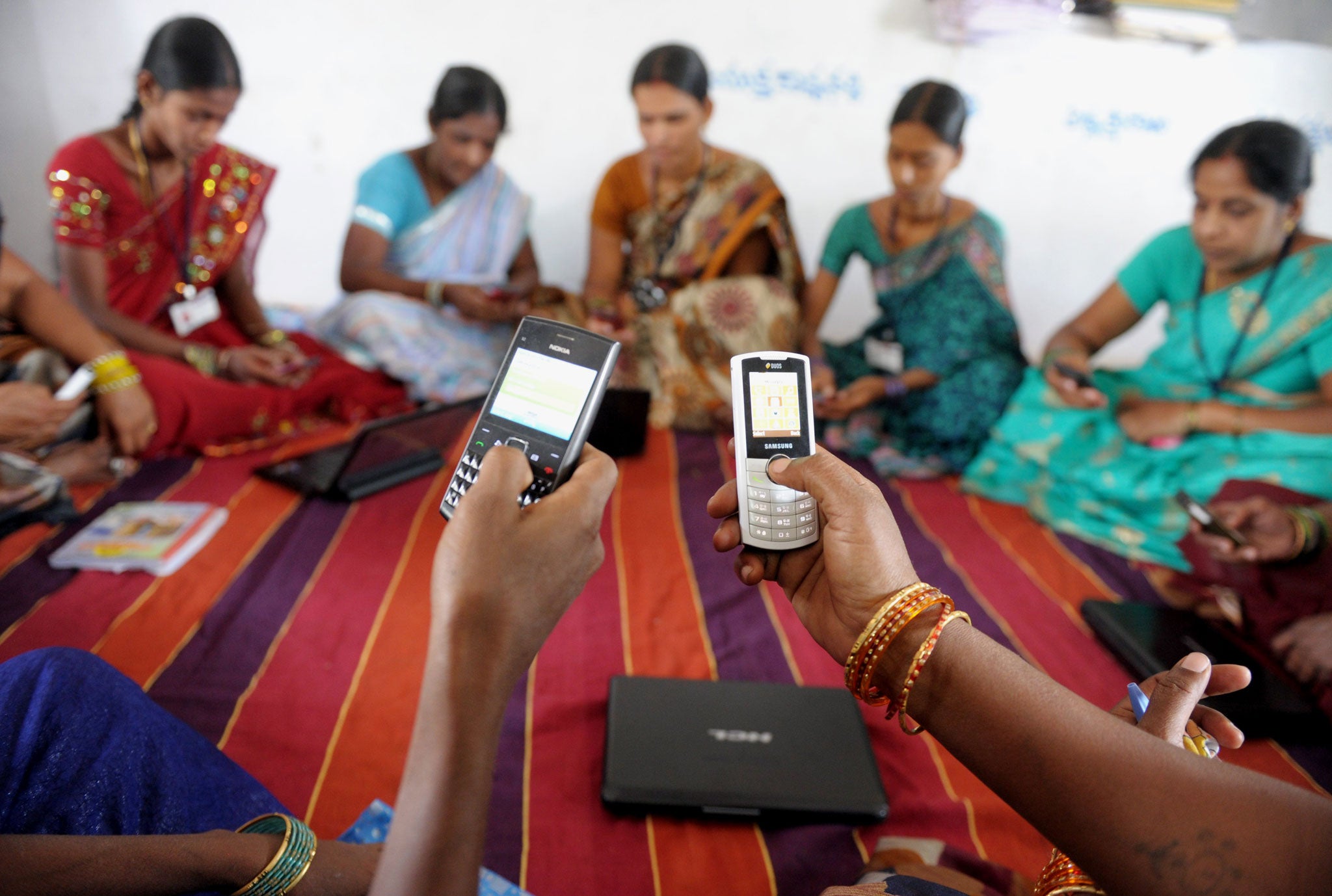How mobile phones are transforming the developing world
There are 78 mobile phone connections for every 100 Indians


Your support helps us to tell the story
From reproductive rights to climate change to Big Tech, The Independent is on the ground when the story is developing. Whether it's investigating the financials of Elon Musk's pro-Trump PAC or producing our latest documentary, 'The A Word', which shines a light on the American women fighting for reproductive rights, we know how important it is to parse out the facts from the messaging.
At such a critical moment in US history, we need reporters on the ground. Your donation allows us to keep sending journalists to speak to both sides of the story.
The Independent is trusted by Americans across the entire political spectrum. And unlike many other quality news outlets, we choose not to lock Americans out of our reporting and analysis with paywalls. We believe quality journalism should be available to everyone, paid for by those who can afford it.
Your support makes all the difference.The row over British press regulation is growing ever more baroque, but in India the issues are starker and simpler. As everywhere else, India’s mass media are in the hands of the wealthy and powerful and their views and interests are carefully respected by those who work for them. The diet of news is carefully cooked and rationed.
But if the middle class suffer from information rationing, outside the cities there is widespread famine. Hundreds of millions of Indians fall outside the pale of conventional news. They lack televisions and computers and live in regions where there are few newspapers, and fewer still who can read them. In central India’s tribal belt, stretching from eastern Gujarat in the west right across to Jharkhand, in the east, the great majority are illiterate. But at least they can know find out what is going on, thanks to a revolutionary way of gathering and broadcasting news. Capitalising on the fact that there are 78 mobile phone connections for every 100 Indians, and even in the countryside 20 connections per 100, a former BBC journalist called Shubhranshu Choudhary, from Chhattisgarh, has set up a phone-based news provider which, for the first time ever, goes to the very heart of the country.
The reporters, who can be anyone at all – let’s call them barefoot reporters – ring a number at Mr Choudhary’s centre, located outside the city of Bhopal. The call is promptly returned, the caller says his piece, which is recorded, edited, and fact-checked by trained journalists at the centre, and then goes live. You can hear it on the centre’s website, cgnetswara.org, or read it in Hindi or English, or alternatively you can simply call up and listen to it on your phone.
In this way, ingenious locals helped by foreign tech experts leapfrog over shortcomings in education and infrastructure and purchasing power, and find ways of enabling millions of the poorest people in the world to learn about what is going on in the world. All thanks to the humble mobile.
The same device is being used in Somalia to overcome the fact that the world’s most disastrous failed state has neither banks nor banknotes. Today mobile phones are used to pay for everything one can imagine, from hotel bills to a twist of salt in the market, to car parking charges at the airport. Returning from Somalia to London and fishing out a bit of paper bearing a picture of the Queen to pay for my coffee, I felt like a relic of the past.
Mind you, the freshness of the technology in use by India’s new media has not made the journalist’s work any less hazardous. CGNet became the first Indian medium to broadcast in Gondi, a tribal language with about two million speakers. But the journalist responsible, Lingaram Kadopi, was arrested in 2010, accused of being a go-between for protection payments by Essar, a mining firm, to Maoist insurgents. He is widely believed to have been set up: his supporters, including Amnesty International, say the charges against him were concocted.
In Britain, mobile phone technology allowed some tabloid journalists to hack into the voicemails of the rich and famous, precipitating Britain’s press regulation crisis. In India the same technology has given millions of the nation’s poorest insight into what is going on around them for the first time ever. However that fact is probably of little consolation to Mr Kadopi, who is still in jail.
Justice is done (at long last)
Another Indian currently detained at the pleasure of the state is arguably more deserving of that fate. When I was this newspaper’s India correspondent 16 years ago, a case known as the “multi-crore fodder scam” was our daily bread. India’s most colourful political loudmouth, Laloo Prasad Yadav, at the time Chief Minister of the state of Bihar, was accused of masterminding the embezzlement of 377 million rupees – about £3.7m at today’s rates – to buy fodder for non-existent cattle. Powerful, ruthless and immensely popular, it seemed unlikely that Yadav would ever be nailed, but yesterday he was given a five-year sentence.
Meanwhile on this side of the world, Silvio Berlusconi, Europe’s answer to Mr Yadav, has failed miserably in his attempt to blackmail a pardon for his crimes out of President Napolitano by pulling his party out of the ruling coalition: for the first time ever, his lackeys defied his will. As I predicted two weeks ago in this space, Mr Berlusconi has amazed us for the last time.
It should be pointed out, however, that the worst he will suffer is being confined inside one of his huge palaces; while Yadav’s prison cell is reported to have every possible amenity.
www.peterpopham.co.uk
Join our commenting forum
Join thought-provoking conversations, follow other Independent readers and see their replies
Comments